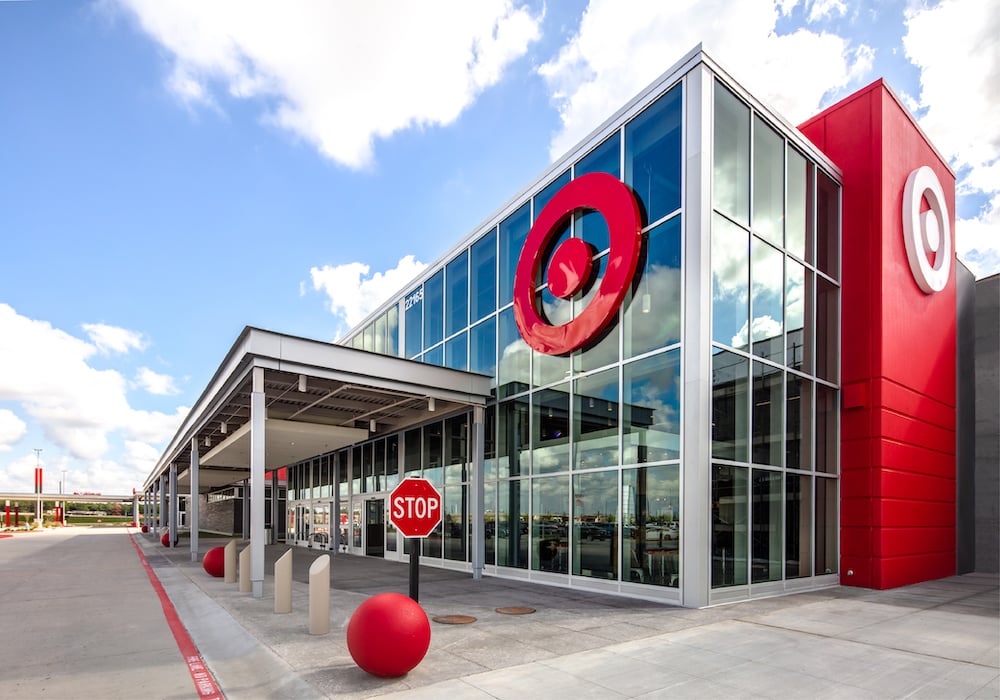Target (TGT +6.85%) and Lowe's (LOW +0.21%) both had impressive first-quarter reports, but only Target's stock is hitting an all-time high. One key difference? Target's management restored full-year guidance. In this episode of MarketFoolery, Motley Fool analyst Emily Flippen, with host Chris Hill, analyzes those stories and highlights a strong end to the fiscal year for Take-Two Interactive (TTWO +1.42%).
To catch full episodes of all The Motley Fool's free podcasts, check out our podcast center. To get started investing, check out our quick-start guide to investing in stocks. A full transcript follows the video.
This video was recorded on May 19, 2021.
Chris Hill: It's Wednesday, May 19th. Welcome to MarketFoolery. I'm Chris Hill. With me today, the one and only, Emily Flippen. Thanks for being here.
Emily Flippen: Hi, Chris.
Hill: We've got video game earnings, we've got home improvement earnings, we're going to start with another all-time high for shares of Target. First quarter profits crushed expectations, same-store sales were up 23%, which was more than double what Wall Street was expecting, and Target also restored full-year guidance.
Flippen: This quarter was insane. When I say insane, insanely unpredictable. For people to remember it, we're coming off of what was an incredible year in 2020 for essential businesses like Target. So all the numbers we're seeing this quarter are on top of what were already really impressive numbers last year. They had a revenue of just under $24 million in the quarter, which was up 23% year over year, earnings that were 64% more than what Wall Street was expecting, and was a 525% increase year over year, and their same-store sales, as you mentioned, Chris, were up nearly 23%, which was also more than double what Wall Street expected. It actually left me scratching my head, thinking to myself, why? Not that target isn't a great business, it's a wonderful business, but what are people buying at Target that led to a 17% increase in traffic comparables, and a 5% increase in basket comparables. The only answer I could come up with was, apparel it seems like, was what management highlighted in their call. Maybe people are getting out more, buying more clothes, I might not be one of them, but that's the only reason I can come up with.
Hill: It is a sneaky part of Target's business that over the past few years they've invested in apparel. I'm trying to remember what year it was, maybe 2016,2017. Whenever they decide to cut their pharmacy business loose, sell it to CVS. When Brian Cornell, the CEO, was asked about what he was going to do with the money, one of the first things he talked about was, ''We're going to invest in apparel.'' There were some groups of people who laughed at that, but Cornell's team and shareholders are having the last laugh now because it's a little similar to what we saw earlier in the week with Walmart, where the average ticket price at Walmart was going up because Walmart is selling more big ticket items. Target doesn't really have the same set of offerings in terms of big ticket items, but what they do have is their own line of apparel.
Flippen: They have apparel. Apparel was up 60%, like I mentioned in the most recent quarter, but there's also a strong growth in their home segment, which is up 30%, and their consumer durables, which was also up 30%. I suppose some of those bigger ticket items, the appliances, those things which go into the consumer durables segment, those were also selling off. Maybe that does help come to that basket growth, that 5% average basket growth, but I just think, having more convenience in terms of traffic, seeing that drive up revenue up a 123% in the most recent quarter, just meant that people were going to Target more often in this quarter than they were even during the pandemic in 2020.
Hill: Again, the stock is hitting an all-time high, so it's natural to look at the business and think, ''Well, oh, OK, let's ratchet down expectations.'' But you have to think that the table is really set for them for the second half of this year when you've got back to school and the pent-up demand around that, particularly when it comes to college students, and then into the holidays. It really seems like they are in good shape.
Flippen: Last critical thing to watch here is actually their owned brand sales as well. All the private-label work that Target has done on the side, there is a 36% growth in that segment, which is pretty great for their most recent quarter. Well, the RedCard usage which has just been slowly declining, which never really was a big part of Target business in the first place, but that owned brand sales, that's high-margin revenue for them and their gross margins for the year were up 5%. From 25% to 30%, so more of that private-label sales is going to help their margins too.
Hill: Same-store sales for Lowe's grew more than 24% in the first quarter, profits and revenue were higher than expected. Yet, just like Home Depot, no guidance from Lowe's. I don't want to ascribe stock moves to any one single thing, but it is not lost on me that Target after a year of saying, ''We're not giving guidance,'' came out and restored full-year guidance, and Lowe's just like Home Depot was saying, ''No, we're not giving guidance.'' The shares are not popping like you would think they would on the results that we just saw at Lowe's.
Flippen: I think I have an answer for you, Chris. I'll get to it in a minute. First, let me say the numbers, because the numbers, as you mentioned, were exceptional. There's an 81% growth year over year in their earnings, which are 20% over expectations. Revenue also beat expectations up 24% year over year, and their same-store sales obviously outstanding up 24% year over year. But when you dig into why Lowe's, and in this case I guess Home Depot as well, are seeing such amazing demand right now, especially from their pro-business, I actually think it comes down to a factor that's largely outside of their control right now, which is lumber. That's not to take away from the exceptional quarter that was their seasonal division, their kitchen division, electrical, all of those things were great for Lowe's, but by far, their best performing segment in the quarter was lumber. That's because lumber prices, if you've been following that at all, Chris, are insane over the past year. They're up 90% on average in the United States year over year. Supply chain disruptions really messed up the lumber industry. Pros and people who are buying it are paying much more for access, which is certainly helping Lowe's and likely Home Depot as well. I think maybe the market is discounting the exceptional quarter this was, because of that lumber factor that's a little bit hard to break out.
Hill: It's absolutely fair. It is interesting to see Lowe's start to emphasize the contract or the professional side of their business a little bit more than they have in the past. Obviously, that's a strategy that's worked so well for Home Depot for years, and Lowe's is getting in on that action too.
Flippen: I'm not going to go on my Marvin Ellison rant because I think many frequent listeners have heard me talk about Lowe's CEO, the former CEO of businesses like JCPenney, which he left in a quick hurry, but certainly Ellison, since he has been coming in, has focused a lot on the pro sales. Typically, this is an area where Home Depot has really outperformed Lowe's. Lowe's is much more targeted to say, a homeowner or small time professional, as opposed to medium and larger businesses, but they're making a more concerted effort and going after that pro-business. I don't have a great sense about the penetration from that pro-business in the most recent quarter, but they did specifically call out the fact that they are on target for small and medium-sized pros coming into Lowe's stores, also a critical metric to watch.
Hill: What's your problem with Marvin Ellison? I'm just looking at the stock since he took over nearly three years ago and it's basically tripled since he's been in the corner office. [laughs] Is it because he left J.C. Penney on alerts?
Flippen: You nailed it, Chris. I'm the bitter daughter of a former J.C. Penney employee. Whereas maybe socialized in her opinion of Marvin Ellison well before Ellison made his way to Los. I am also maybe a slightly better shareholder of Home Depot as opposed to Los here. I'm coming in with a pretty biased opinion.
Hill: Just like every investor just like me, just like everyone else that comes on the show, just like everyone who's listening, we all have our biases, that's fine.
Flippen: Yeah. The difference is you didn't know that when you asked me to come on today's show.
Hill: I did not. Shares of Take-Two Interactive were up 5% this morning after the video game maker ended the fiscal year with a bang. Fourth quarter profits were much higher than expected, revenue too. This is what we've been seeing out of this industry, we saw this last week with Electronic Arts and Zynga. This is a really strong quarter.
Flippen: I'll tell you what blows my mind the most about this quarter and about Take-Two in general: how there are still so many people playing NBA 2K and Grand Theft Auto and Red Dead Redemption. These are old franchises that are just so profitable for Take-Two Interactive. Are their earnings for, again 40% above expectation largely led by the NBA business, NBA 2K series. When you look at the guidance that Take-Two laid out, again, the focus is more than 55% I believe of net bookings. They expect to be on the 2K chain of games. So a lot of reliance there upon the steelers Zynga term forever franchises. But the good news is that even while guidance for this business was lackluster because they're worried about people spending less money on games as the pandemic slowly winds down here. The good news is that there's still a pretty robust pipeline in terms of future games, both new ones as well as expansion on existing franchises. So the pipeline for Take-Two is still wonderful.
Despite the lackluster guidance, this quarter was outstanding as well. See my reaction when I was on their website earlier today looking at their portfolio of games was, i was actually comforted seeing the games that you mentioned because I recognize them because initially on the site i was like,'' I haven't heard of any of these games.''' Now I'm not a gamer but I've got one in my house and he's not really big for anything in the Take-Two universe. But I'm wondering if you think that we talked about this recently with Activision Blizzard and Call of Duty. I'm wondering if you think the whole idea of sunk cost plays into the advantages that these video game companies have. By that I mean, for people who just decide, ''All right, I'm going to go all-in on Grand Theft Auto,'' or they get hooked on it early or Call of Duty or any franchise for that matter. These are not Zynga type games, these are not mobile games that cost a couple of bucks, these cost $75 in that neighborhood. It's the thing where well, if you've already spent the money upfront and you know the franchise unit then I'm not saying there's a big switching costs for gamers but there's a comfort. Hey, I like this universe whether it's NBA 2K or Call of Duty or anything else. I actually think it has a social aspect to it as well.
Once you have yourself accustomed to the game, you have a group of friends who maybe engaged in that game with you playing it alongside you, it is harder to convince many people to make that switch as opposed to any single person. I will say about the NBA 2K series is I see a lot of growth in Asia and in China in particular. While they're working on expanding in the U.S. they're actually saturating the U.S. market. From now on, it's really largely an international growth story, especially in China. But for the people that they do retain within these franchises, they do tend to spend more money over time which is why, again, when you're looking at any gaming business especially businesses like Zynga or Take-Two you really want to look at their net bookings.
Many people might hear that and think bookings for a videogame company. But this is just really in-game content spend that the businesses have to recognize over an extended period of time as opposed to recognize it upfront. Very similar to mobile games but there are endgame expenses for businesses like Take-Two. The net bookings were up 19% as well over the past year. Take-Two not only is it growing in terms of just single time game sales. You talked about those high upfront purchase prices. But they're also growing a lot in the engagement in games spend that they're getting from those same purchasers.
Hill: Emily Flippen, always great talking to you. Thanks for being here.
Flippen: Hey, thanks for having me on.
Hill: As always, people on the program may have interest in the stocks they talk about and The Motley Fool may have formal recommendations for or against so don't buy or sell stocks based solely on what you hear. That's going to do it for this edition of MarketFoolery. This show is mixed by Dan Boyd. I'm Chris Hill. Thanks for listening, we'll see you tomorrow.





